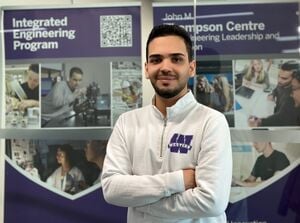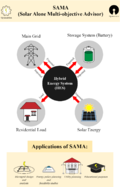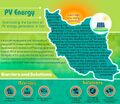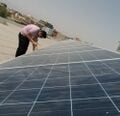
Currently developing an open-source software called Solar Alone Multi-objective Advisor (SAMA)
Biography[edit | edit source]
Seyyed Ali Sadat was born in Kashan, Iran. His interest in Mathematics and Physics was discovered by his family during childhood. Because of this passion, he studied Mathematics and Physics in high school, where he achieved GPA 4/4 in full duration of high school and received top student awards from high school president. In 2014 participated in the Iran's universities entrance exam where his outstanding results, as well as his interests, led him to study mechanical engineering at the University of Kashan, one of the top universities in Iran. During his bachelor of science courses, he finds his particular interest in the energy fields, especially renewable energy sources. Finally, he graduated in bachelor of science with cumulative GPA 3.84/4 ranked within top 3 students of mechanical engineering department (Class 2015 among 167 students).
Motivation[edit | edit source]
Seyyed Ali Sadat's lifetime has coincided with the flourish of the high-tech and advanced energy engineering industry. This abundant interest led him to choose engineering as his university major. As an undergraduate engineering student with an ardent interest in renewable energy systems and energy policy analysis, he learned crucial principles applicable to most tools and processes that naturally broaden his learning and research scope.The wide range of theoretical knowledge and skills, which his academic experiences have provided, will be extremely useful when studying at the graduate level. He tried so hard to gain the best GPA at the university as well, and he was ranked within the top three students of his year level. During the undergraduate period, all of these efforts made him a consistent and persistent student with a great opportunity offered to him; undergraduate research assistant of the energy research institute at University of Kashan, Iran. He put effort into acquiring knowledge, and also it was an excellent opportunity for him to be part of a group. As an undergraduate student, he never stayed in his comfort zone for too long, as his résumé bear out this claim.
Seyyed Ali Sadat's burning ambitions led him to start his graduate career at Western University and Free Appropriate Sustainability Technology (FAST) Research Group under supervision of Prof. Joshua Pearce, which would equip him with comprehensive and specialized skills. By studying at Western University and FAST, he will become an academic researcher, expert and qualified enough to become a professional scientist in his field to help and attract the industry to PV technology as well as green energy sources. He would also like to become an active member in the academic field to influence future generations.
Main Academic Goals[edit | edit source]
- Conducting high-quality researches using State-of-Art for the benefits of Mankind and Science
- Researching for deployment and development of renewable energy technologies in developing world
Seyyed Ali Sadat's Research Interests[edit | edit source]

- Renewable Energy Management and Engineering: Optimization, Forecasting and Prediction, Performance and Efficiency Analysis, Design for developing world, Uncertainty, Application of machine learning in energy management
- Renewable Energy policy: Development of renewable/clean energies in developing world, Application of MCDM approaches in green energy policy
Current Research[edit | edit source]
He is currently a researcher at FAST under supervision of Prof. Joshua Pearce working on:
- Designing a open-source PV frame
- Designing a twin-screw extruder and 3D-printer head
- Energy policy analysis
Solar Alone Multi-objective Advisor (SAMA)[edit | edit source]
The research investigates the economic feasibility of grid-defection and self-generation of electricity through hybrid energy systems. The hypothesis is that optimizing these systems using advanced algorithms and an open-source software can lead to cost savings and reduced dependence on traditional grids. The objectives are to develop a user-friendly software coded in both MATLAB and Python, which incorporates utility rate structures along with emission control strategies, and assesses the probability of grid-defection worldwide. The desired outcome is a open-source software named SAMA that enables users to evaluate the economic viability and benefits of grid-defection. This research informs strategic energy planning, reduces operational costs, and enhances sustainability efforts. The findings have beneficial policy implications for decision makers such as carbon emissions reduction and a transition to a sustainable energy future.
Requirements and Opportunities for SAMA project:[edit | edit source]
- Implement other system, energy technologies, and ideas to the SAMA through internships
- Research partnership for further development of software
- Professional web developer to create an online-user friendly web tool
- Providing applicable data for SAMA simulations such as users electrical load data-Making simulations for ordinary users easier
- Artificial intelligence (AI), deep learning and Big data implementation into SAMA
- Debugging SAMA to find all the potential problems and propose new ideas to improve the software
Projects Completed[edit | edit source]
2019 Projects[edit | edit source]
- Mega Energy Storage for Developing World Analysis and Design
- Techno-economic comparative study of hybrid microgrids in eight climate zones of Iran
2020 and 2021 Projects[edit | edit source]
- PV development in Iran
- A new stochastic optimal smart residential energy hub management system for desert environment
2022 Projects[edit | edit source]
- A Review of the Effects of Haze on Solar Photovoltaic Performance
- Open source surgical fracture table for digitally distributed manufacturing
2023 Projects[edit | edit source]
- A Free and open-source microgrid optimization tool: SAMA the Solar Alone Multi-Objective Advisor
- Mechanical and economic analysis of conventional aluminum photovoltaic module frames, frames with side holes, and open-source downward-fastened frames for non-traditional racking
Education[edit | edit source]
- Bachelor of science in mechanical engineering, University of Kashan, Kashan, Iran
GPA: 3.84/4 (18.30 out of 20) Overall.
- High-School Diploma in Physics and Mathematics, Ghadir high school, Kashan, Iran
GPA: 4/4 Overall.
Publications[edit | edit source]
Bachelor of science thesis[edit | edit source]
- Mega Energy Storage for Developing World: Analysis and Design, (Grade: 20 out of 20), Results: doi: 10.13140/RG.2.2.18257.86883
Journal articles[edit | edit source]
Under Review[edit | edit source]
- Sadat, S.A and Pearce, J.M., 2023,The threat of economic grid defection in the U.S. with solar photovoltaic, battery and generator hybrid systems, Renewable and Sustainable Energy Reviews.
- Jamil, U., Sadat, S.A, Pearce, J.M., 2023, Distributed Manufacturing for Distributed Generation: 3-D Printed Solar Photovoltaic Module Mounting Mechanisms for Wood Racking, Renewable Energy.
Published[edit | edit source]
- Sadat, S.A., Takahashi, J. and Pearce, J.M., 2023. A Free and open-source microgrid optimization tool: SAMA the solar alone Multi-Objective Advisor. Energy Conversion and Management, 298, p.117686, doi:10.1016/j.enconman.2023.117686.
- Sadat, S.A., Vandewetering, N. and Pearce, J.M., 2024. Mechanical and economic analysis of conventional aluminum photovoltaic module frames, frames with side holes, and open-source downward-fastened frames for non-traditional racking. Journal of Solar Energy Engineering, 146(2), doi:10.1115/1.4063493.
- Sadat, SA., Hoex, B.., Pearce, J.M., "A Review of the Effects of Haze on Solar Photovoltaic Performance", Renewable & Sustainable Energy Reviews Journal, Volume 167, October 2022, 112796, doi:10.1016/j.rser.2022.112796.
- Bow, J., Gallup, N., Sadat, SA., Pearce, J.M., "Open Source Surgical Fracture Table for Digitally Distributed Manufacturing, PLOS One Journal, 17(7):e0270328, doi:10.1371/journal.pone.0270328.
- Sadat, SA., Vakilalroaya fini, M. R., Hashemi-Dezaki, H., Nazififard, M., "Barrier analysis of solar PV energy development in the context of Iran using fuzzy MCDM methods", Sustainable Energy Technologies and Assessments Journal, Vol.47, October 2021, doi: 10.1016/j.seta.2021.101549.
- Sadat, SA., Faraji, J, Nazififard, M, Ketabi, A., "The experimental analysis of dust deposition effect on solar photovoltaic panels in Iran's desert environment", Sustainable Energy Technologies and Assessments Journal, Vol.47, October 2021, doi: 10.1016/j.seta.2021.101542
- Imanloozadeh, A., Nazififard, M., Sadat, SA., "A new stochastic optimal smart residential energy hub management system for desert environment", International Journal of Energy Research, 2021, doi: 10.1002/er.6991.
- Sadat, SA., Faraji, J, Babaei, M, Ketabi, A. "Techno-economic comparative study of hybrid microgrids in eight climate zones of Iran" Energy Science & Engineering Journal. 2020; 8: 3004– 3026. doi: 10.1002/ese3.720
Conference Proceedings[edit | edit source]
- Sadat, SA, Nazififard, M., "Introducing a Novel Hybrid Mobile Energy Storage System for Vulnerable Community Resilience Support," 2020 6th International Conference on Electric Power and Energy Conversion Systems (EPECS), Istanbul, Turkey, 2020,pp. 46-51, doi: 10.1109/EPECS48981.2020.9304524

Awards and Honors[edit | edit source]
- Top student researcher award, Based on research performance at Energy Research Institute, University of Kashan.
- Ranked within top three students (Graduated in the top three student/2% of my year level) Based on GPA of 3.84/4 in Mechanical Engineering department, In full duration of Bachelor of Science, Competition among 167 students, Ranking by University of Kashan.
- Offered straight admission for M.Sc. in Energy Systems Engineering Tuition fee and entrance exam waived as award for being talented student, University of Kashan, Iran.
- Top student award Based on GPA of 4/4 in high-school, Physics and Mathematics, Awarded by Ghadir High school, Kashan, Iran.
See also[edit | edit source]
Other webpages[edit | edit source]
Additional pages to manage[edit | edit source]
Case studies investigated with SAMA
Solar Alone Multi-objective Advisor (SAMA)
Should I leave the grid? FAST literature review: Should I leave the grid? FAST literature review
Open-source PV frame literature review: Open-source PV frame design:FAST literature review
Twin-screw literature review: Twin screw extruder design literature review
Solar Trailer Project: Mega Energy Storage for Developing World Analysis and Design
Research Project: PV development in Iran
Media[edit | edit source]
How to configure Solar Alone Multi-objective Advisor (SAMA)
Image gallery (Brief illustrations of what I have done to date)[edit | edit source]
-
SAMA logo
-
Solar Alone Multi-objective Advisor (SAMA) coding in Python
-
Seyyed Ali Sadat working on finite element analysis (FEA)
-
Solar Alone Multi-objective Advisor (SAMA)
-
Proposing new open-source PV frames
-
Open source surgical fracture table for digitally distributed manufacturing
-
Impact of haze on PV performance
-
Graphical abstract of one of my research works
-
My B.Sc. thesis 3D model designed in CATIA
-
My B.Sc. thesis prototype made by 3D printer
-
My B.Sc. thesis prototype made by 3D printer
-
PV laboratory
-
PV power plant assessment
-
Dust collection from PV power plants for laboratory analysis















